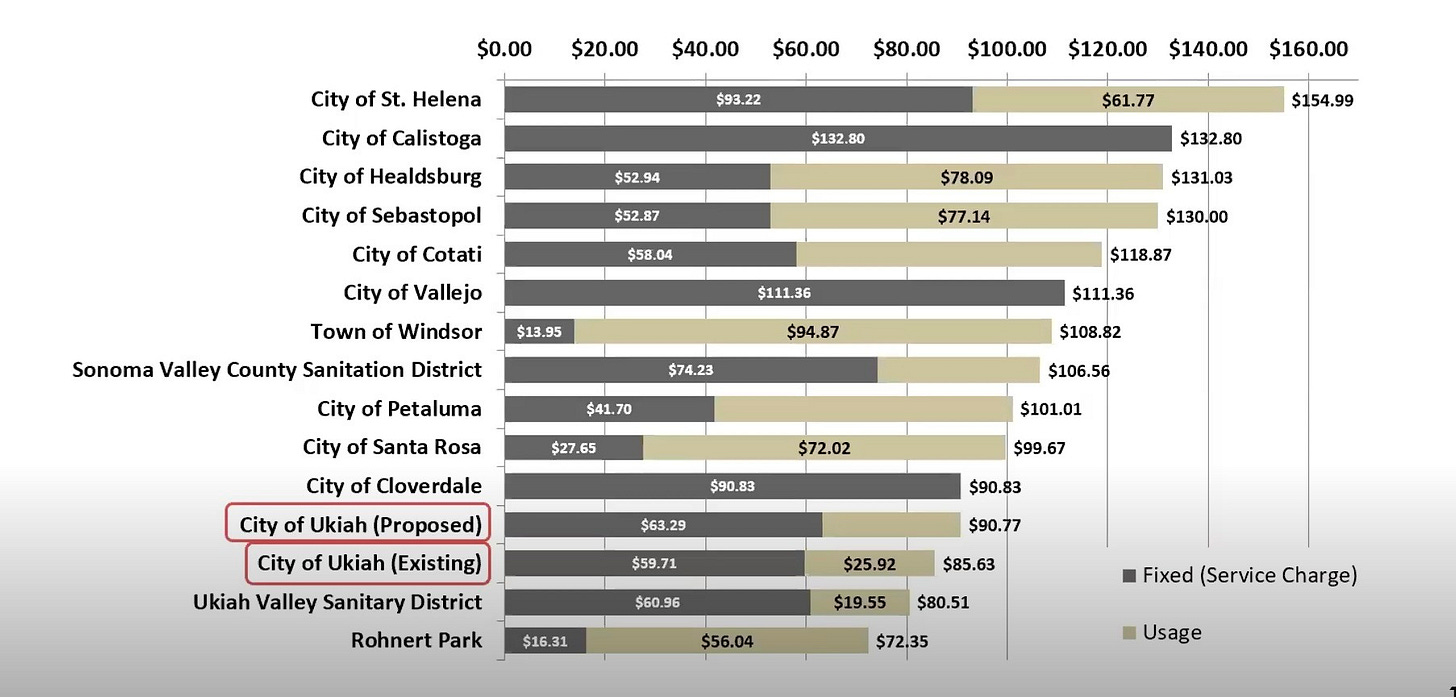Ukiah Sewer Rates Poised for Huge Jump After One-Minute Protest Hearing
Sewer costs projected to rise 36% from 2024 to 2030
The Ukiah City Council unanimously voted Tuesday to increase sewer service rates by 22 percent after a one-minute “protest hearing.” Combined with last year’s approval of a 14 percent increase, the total sewer rate hike from 2024 through 2030 is 36 percent.
The increase was discussed at the July 16, 2025, council meeting. No public comment was received then, and there was no media coverage of the proposal. (See note to readers at the end of this article.)
The July meeting launched a legal process allowing ratepayers to negate the increase if enough ratepayers protested. On Tuesday, city staff suggested 1,766 active accounts as the threshold for preventing the increase, though this figure was not mentioned in the notice sent to ratepayers. The notice described how to submit a written protest but did not encourage residents to comment publicly.
Twelve people submitted written protests. Here is a sampling of their comments:
“It is just so difficult to manage increasing expenses from every direction while finding no way to earn enough to cover it all,” one ratepayer wrote.
A 30-year resident who has made it a point to pay all her bills on time described the impact on her budget. “I’m now a senior citizen living on a fixed income,” she wrote. “My Social Security payments are less than $1,000 per month. My property taxes are over $500 per month. I feel like I’m being forced out of my house. I can barely afford to make ends meet. After contributing financially to this community for more than 30 years, I feel I am being punished with ever-increasing bills.”
An 81-year-old resident wrote that if the increase took effect, “I would probably find a way to reduce my bills so I can stay in my home. But it will be difficult.”
A 75-year-old resident wrote: “I’m on a budget that keeps getting smaller. … My health care just went up $35, which means I’m paying $300 a month for that. I’ve learned to live without air conditioning. I don’t flush my toilet every time I use it. I budget everything I possibly can.”
At the July 16 meeting, consultant Mark Hildebrand and City Finance Director Dan Buffalo described the decisions that made the rate hike inevitable, starting with grant applications for road projects.
“The success of these road grants necessitated a faster-than-anticipated capital improvement replacement program for underlying infrastructure, including sewer lines,” Buffalo said, adding that it was “appropriate and advisable” to do the sewer projects alongside the road work.
From fiscal year 2020-21 through 2024-25, Ukiah spent an average of $2.8 million a year on capital projects to rehabilitate or improve the sewer system. Forecasted spending from fiscal 2025-26 through 2028-29 averages about $1.2 million.
The capital projects, combined with a 4.5 percent decrease in rate revenue in 2023-24, drained the city’s sewer enterprise funds. At the start of the 2024-25 fiscal year, the balance of those funds for operations and rate stabilization was $584,000.
Other factors include rising insurance costs, projected to increase 7 percent annually, and a policy shift allocating some recycled water costs—previously paid entirely by the water utility—to the sewer fund.
Altogether, the rate increase is intended to rebuild depleted reserves, with a target of $1.8 million (25 percent of annual operating costs), and to create a new $1.3 million capital reserve.
This additional $3.1 million will be raised over the next five years. In the short term, the city plans to fund the depleted operating fund with a $2 million internal loan.
Hildebrand told the council July 17 that even with the increase, Ukiah’s rates are relatively low. A regional comparison of typical monthly sewer bills for single-family homes showed Ukiah with the third-lowest rate. (See above chart.)
“It’s not a good thing to be at the bottom necessarily,” Hildebrand said. “Whereas people might want to indicate that that shows efficiency, lots of times being at the very bottom might be an indication that there’s a lack of reinvestment in infrastructure.”
Councilmember Mari Rodin said it was “a consolation” that Ukiah’s rates remain comparatively low. She also noted that because the increase applies to both the fixed monthly charge and the usage-based rate, residents who consume less will see a smaller hike.
“I just want to emphasize, and I think I can speak for all of us, that we’re very sympathetic to the concerns of residents, particularly those on fixed incomes, for whom this increase poses a big hardship,” Vice Mayor Susan Sher said. “It gives us no pleasure to raise these rates. But the city has to deal with inflation, and the inflation is caused by circumstances beyond our control.”
The staff report listed several options for residents struggling with the higher bills:
United Way, Catholic Charities and other nonprofits can provide emergency utility bill assistance to qualifying households.
County and local social services agencies, including Mendocino County Health and Human Services Agency, can connect residents with financial support.
Payment arrangements may be available through the city to help customers manage balances over time.
Read more of our reporting on public utilities:




It's interesting to note the rate comparisons they used. Nothing in Lake or Humboldt counties where wages are comparable to Ukiah, they use Healdsburg, Peteluma etc. where average wage is near double ours.
Again, City staff thinks we're stupid.
When rural poor Republicans vote for wealthy Republican, expect cuts along with rate increases to line those rich Republican pockets while the defund services.